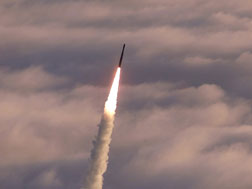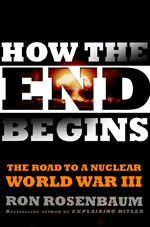The Aurora from Terje Sorgjerd on Vimeo.
domingo, março 27, 2011
terça-feira, março 22, 2011
sexta-feira, março 11, 2011
terça-feira, março 08, 2011
Uma prova ou mais uma ilusão?
Cientistas, no entanto, têm criticado duramente a descoberta
Riccardo Guerrero/Reuters |
SABINE RIGHETTI
DE SÃO PAULO
A equipe de astrobiologia da Nasa está de novo chamando atenção da comunidade científica. Desta vez, um cientista diz ter encontrado evidências de bactérias extraterrestres fossilizadas em três meteoritos que atingiram a Terra.
A polêmica está em um artigo assinado pelo astrobiólogo da Nasa Richard Hoover, publicado na revista científica americana "Journal of Cosmology".
O estudo afirma que, durante uma análise da estrutura dos meteoritos, foram encontradas evidências de organismos similares às cianobactérias (que podem viver em condições extremas).
A característica desses organismos, no entanto, seria diferente das bactérias terrestres. Para o autor do trabalho, o tamanho e a composição química dos filamentos não condizem com o que existe aqui na Terra.
Hoover descartou a possibilidade de que as estruturas tenham sido contaminadas depois que os meteoritos caíram no planeta.
Para ele, a quantidade mínima de nitrogênio encontrada neles mostra que são fósseis realmente antigos.
CONTROVÉRSIA
O "Journal of Cosmology" recebeu duras críticas da comunidade científica, que alegou que a publicação não tem credibilidade -inclusive porque é independente e tem livre acesso na internet.
Cientistas também afirmaram que a pesquisa de Hoover não reuniu as evidências necessárias para comprovar suas afirmações.
Mas o editor do "Journal of Cosmology", o astrofísico Rudolph Schild, da Universidade de Harvard, rebateu as críticas recebidas.
Em um comunicado, ele chamou o trabalho de "muito importante" e disse ter convocado especialistas para que comentem o estudo.
"Convidamos cem especialistas que enviaram um convite a mais de 5.000 cientistas para revisarem o estudo e apresentarem suas análises críticas", disse.
De acordo com o astrobiólogo Douglas Galante, do Instituto de Astronomia, Geofísica e Ciências Atmosféricas da USP, os resultados achados ainda são preliminares.
"O interessante é que a validação desses dados está sendo feita de maneira aberta à comunidade científica."
"Isso é bem diferente do que aconteceu quando a Nasa anunciou a descoberta da bactéria que substituiu o fósforo [um dos seis elementos essenciais à vida] pelo arsênio na sua composição", diz.
Essa pesquisa, publicada em dezembro de 2010, ainda tem recebido críticas.
segunda-feira, março 07, 2011
A pergunta proibida da Era Nuclear

An Unsung Hero of the Nuclear Age
Maj. Harold Hering and the forbidden question that cost him his career.
By Ron RosenbaumPosted Monday, Feb. 28, 2011, at 5:40 PM ET It was a risk. Dedicating a book to someone I'd had had a five-minute phone conversation with three decades ago. Someone who, last I'd heard, had become a long-haul trucker and whom I'd given up trying to track down.
It was a risk. Dedicating a book to someone I'd had had a five-minute phone conversation with three decades ago. Someone who, last I'd heard, had become a long-haul trucker and whom I'd given up trying to track down.
But I went ahead and dedicated my new book,How the End Begins: The Road to a Nuclear World War III, to Maj. Harold Hering because Maj. Hering sacrificed his military career to ask a Forbidden Question about launching nuclear missiles. A question that exposed the comforting illusions of the so called fail-safe system designed to prevent "unauthorized" nuclear missile launches.
It was a question that changed his life, and changed mine, and may have changed—even saved—all of ours by calling attention to flaws in our nuclear command and control system at the height of the Cold War. It was a question that makes Maj. Hering an unsung hero of the nuclear age. A question that came from inside the system, a question that has no good answer: How can any missile crewman know that an order to twist his launch key in its slot and send a thermonuclear missile rocketing out of its silo—a nuke capable of killing millions of civilians—is lawful, legitimate, and comes from a sane president?
I tried to track Hering down before my book went to press but failed to connect. And so I chanced it, dedicating the book to someone who, for all I knew, had gone from self-sacrificing hero to—who knows?—subprime mortgage broker? Not that it would have diminished his original sacrifice; heroes don't always fare well after they've left the stage, especially when they go unsung.
But I had an intuition when I first read about Maj. Harold Hering and his Forbidden Question that in addition to courage he had a rare kind of uncompromising integrity. And when I finally tracked him down ... well, let me first explain why I think he's an American hero.
Let's say you were a Minuteman missile crewman during the Richard Nixon presidency at the very height of the Cold War. You and your fellow crewmen are down in your underground launch control center, tending to your sector of the "silo farm"—the vast field under which nuclear missile silos (actually heavily reinforced concrete silo-shaped holes in the ground) shelter the instruments of mass death that lurk beneath the bleak badlands of the northern Great Plains. There you are, running through a drill, going down a routine checklist for launch readiness, when suddenly you get what seems like a reallaunch order. Not a drill. Get ready to twist your launch keys in their slots and send anywhere from one to 50 missiles rocketing toward Russia. World War III is under way.
Or is it? Your launch order codes are "authenticated," everything seems in order, the seconds tick away. But in what may be the last seconds of your life—for all you know Soviet missiles are about to rain down on the plains—a thought crosses your mind. About "authentication." It's supposed to ensure that the launch order comes from the president himself, or (if the president has been killed) from the surviving head of the nuclear chain of command.
But what about that person at the top of the chain of command, the person who gives the order? Has he been "authenticated"? Who authenticates the authenticator? Can the president start a nuclear war on his own authority—his own whim or will—alone? The way Brigadier Gen. Jack D. Ripper did in Dr. Strangelove? What if a president went off his meds, as we'd say today, and decided to pull a Ripper himself? Or what if a Ripper-type madman succeeded in sending a falsely authenticated launch order? You're about to kill 10 million people, after all.
 Such a scenario was not inconceivable at the time when Maj. Hering was going through missile training class at Vandenberg Air Force base. Bruce Blair (then a missile crewman himself, a wing commander in charge of 200 minuteman missiles, and now the head of the nuclear abolitionist Global Zero Initiative) discloses in my book that he had figured out a way to launch all 200 of his "birds" without authorization. Good thing he's a very stable guy.
Such a scenario was not inconceivable at the time when Maj. Hering was going through missile training class at Vandenberg Air Force base. Bruce Blair (then a missile crewman himself, a wing commander in charge of 200 minuteman missiles, and now the head of the nuclear abolitionist Global Zero Initiative) discloses in my book that he had figured out a way to launch all 200 of his "birds" without authorization. Good thing he's a very stable guy.
But you've probably read about Richard Nixon acting erratically, drinking heavily as Watergate closed in on him. You may not have read about the time he told a dinner party at the White House, "I could leave this room, and in 25 minutes, 70 million people would be dead." (Try that line out at one of your dinner parties. I've always found it a good conversation starter.)
Anyway, back down there in your launch capsule you might allow yourself to wonder: "This launch order, is this for real or for Nixon's indigestion?"
If you were asking yourself that question, you wouldn't be the only one. James Schlesinger, secretary of defense at that time, No. 2 in the nuclear chain of command, was reported to be so concerned about Nixon's behavior that he sent word down the chain of command that if anyone received any "unusual orders" from the president they should double-check with him before carrying them out.
So there you are, having just received the order to launch nuclear genocide. Should you suppress any doubts, twist your launch key in the slot simultaneously with your fellow crewman and send death hurtling toward millions of civilians halfway around the world? Without asking questions? That's what you're trained to do, not ask questions. Trainees who asked questions were supposed to be weeded out by the Air Force's "psychiatric consideration of human reliability" requirement. I've read this absurd Strangelovian document, which defined sane and reliable as being willing to kill 10 or 20 million people with the twist of a wrist, no questions asked.
Maj. Hering decided to ask his question anyway, regardless of consequences: How could he know that an order to launch his missiles was "lawful"? That it came from a sane president, one who wasn't "imbalance[d]" or "berserk," as Maj. Hering's lawyer eventually, colorfully put it?
Hering needed a lawyer because as soon as he asked the question he was yanked out of missile training class, and after two years of appeals, eventually had to leave the Air Force, trade in a launch key for the ignition keys to an 18-wheeler.
But he forced the Air Force to face the question. We couldn't ignore the problem any longer. Although, as it turned out, we couldn't solve it, either.
(Continua aqui.)